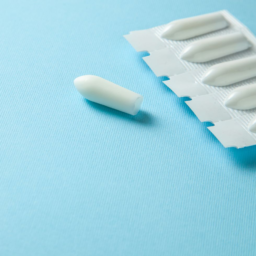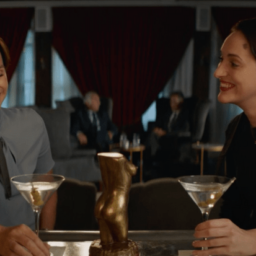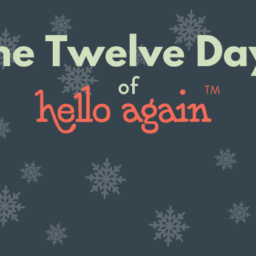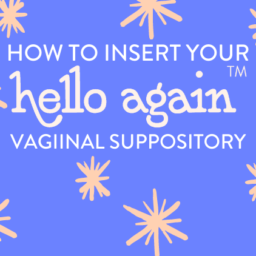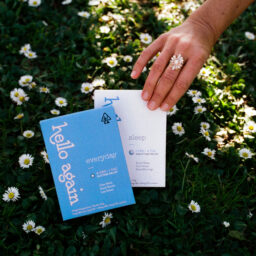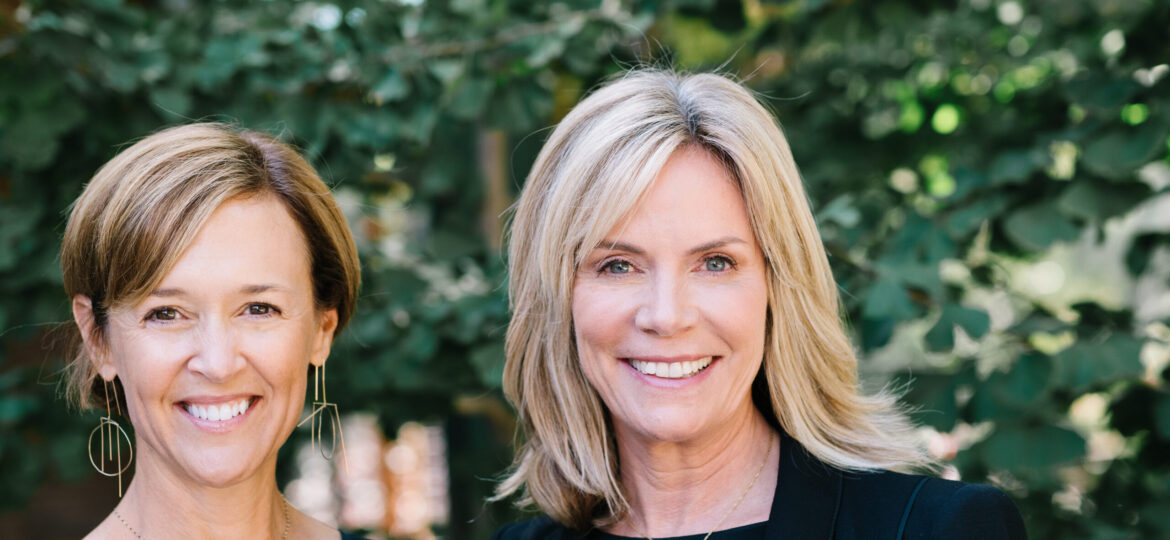
The following interview is a transcript from Carrie and Patty’s interview with Rose Mattio on the From Pot to Popular podcast.
Rosie: I’m Rosie Mattio and welcome to from Pot to Popular. A new podcast, where we interview the media, marketers, and moguls for mainstreaming cannabis.
Welcome to today’s episode of From Pot to Popular. I’m your host, Rosie Mattio and today we are joined by Carrie Mapes and Patty Pappas, the founders of Hello Again. Hello Again is a female-focused cannabis company that aims to help women through every phase of life. They’re joining us during World Menopause Month, where they talk about the impact of cannabis on the lives of females and the products they’re trying to innovate with, to help women throughout the globe. Welcome, Carrie and Patty.
Patty: Thank you, Rosie.
Carrie: Thanks for having us.
Rosie: I’m very excited to have you guys. It’s been a great partner with you guys over the past year or so since we’ve been working together. So, your story truly highlights a solution-centered approach that many cannabis entrepreneurs have taken in this space. Can you talk us through what Hello Again is, how you decided to start the company and what your vision was?
Carrie: Definitely. Well, Happy Global Menopause month, everybody! We are a menopause solution. We are a cannabis-based, vaginal suppository that has targeted the major symptoms of menopause. Now, menopause is not a disease, so technically it doesn’t have symptoms, but we’ll just call them symptoms for now for ease of communication. Patty and I have been friends for over 20 years. Our oldest kids are 23. We met when they were in preschool and we’ve been in and out of each other’s lives since. It wasn’t until our youngest kids went off to college that we went to a dispensary out of curiosity.
Patty: So, we walked into the dispensary just for fun. And we started asking the budtenders what all the products in the cases were for. It was a different market a couple of years ago. It’s gotten much more sophisticated and healthier; there are more health and wellness choices now. But back then, as we were talking about all the symptoms that could be relieved from the products on the shelves, we recognized a lot of issues Carrie and I were going through in menopause. Things like memory fog, things like mood, sleep issues, hot flashes, temperature regulation, were all issues that these products were addressing. And so, we went on an exploration tour of all the different products. We didn’t want to smoke. We weren’t smokers. We didn’t want to vape. The edibles were really inconsistent and we tried to find something that worked for us, but we couldn’t find it.
Carrie: Yes, and we really didn’t want something to get high. The idea that we had was that we should be harnessing all of this potential in cannabis to relieve our symptoms, just so we can feel like ourselves again. That’s what I wanted, was to feel like myself again, and to be able to take something and then approach my day. Drive my kids, have meetings, et cetera, work, whatever and there was certainly nothing like that there.
Patty: Right, so we just decided we would make it ourselves.
Rosie: We love that. Necessity is the mother of all inventions. It sounds like great products are created because people realized that they had a need and other people might have those same needs. So it’s definitely a common story that we’re seeing from people approaching cannabis. And I want to talk a little bit more about Hello Again in a second, but I’ll also just touch on your background. As a woman, you grew up during the war on drugs and in a cultural climate that vilified cannabis use. How has the process of starting Hello Again challenged or shaped your preconceived notions of the plant.
Patty: I think those initial trips into the dispensary were very eye-opening. It was a different idea than pulling up on a corner, back in the late seventies and buying something. These dispensaries were sophisticated and some of them were very beautiful. They were like jewelry stores and they had thoughtful products laid out and that was the first step in just realizing this is a legitimate thing that can actually help people.
Carrie: And the sophistication of the budtenders that we talked to. We really learned a lot in those early days where we just went in and started asking questions. The information was very professionally described to us. And those interactions drove us up the learning curve. They were very meaningful. But you’re right, we did grow up during the war on drugs, and growing up, I really didn’t have any relationship with cannabis. It was kind of a boys’ drug at my high school and I was a little chicken.
To be honest, I had my share of wine coolers and whatnot, but cannabis just wasn’t a part of my teenage years. My dad died of stomach cancer when he was in his fifties. I was in my early twenties and I was taking care of him and remember being approached by somebody who was getting a lot of relief from cannabis. And my whole family was said “no, no, no”, myself included. It breaks my heart, looking back, it could have helped a ton, but our mindset was different and it’s different again today.
Patty: And then to educate ourselves we really went on a tour of every aspect of the cannabis business. One of our stops was at a couple of growth facilities and watching the care and the attention that they were putting into growing these plants definitely took away all that illegal feel, that under the cover type aspect to it. It was a really thoughtful process and I appreciated that.
Rosie: Yeah, and this actually brings me to my next question about the process. So, you guys had this idea, a need-state, and I’m sure many of our listeners are curious, how do you guys go about formulating specialized products for menopause care? What was the R&D process like? How did you guys really bring this product to market and were there any resources or mentors you turned to during this period?
Carrie: Well, in the early days, we naively enough thought that this was more of a marketing problem than it was an actual product creation. We thought, “no, nothing here is marketed for women in menopause, we could do a much better job with that”. But, really quickly, we realized that this needed to be a vaginal suppository in order for it to be consistent from woman to woman, and effective, and also allow for us to use enough THC to get the efficacy without creating a psychoactive high. So, at that moment in time, we realized, oh, no, we’re talking about product creation.
Patty: And a product that is not that easy! It’s not a chocolate…. a beautiful chocolate bar…it takes a little bit more to get a consumer around the idea of a suppository.
Carrie: Right. So, I would say one of the benefits…there have certainly been some struggles in starting a business for the first time in your fifties, which is what we’re doing (neither one of us has been entrepreneurs before), but one of the benefits is that we were unabashedly tenacious and I think if we had tried this in our twenties, we would have been a little bit shyer about our idea or we would have taken somebody else’s word over what we knew in our hearts. And so, we had that going for us and we also had living life where we live it, for the number of decades that we’ve been in Los Angeles. Once we put it out there and really started pursuing formulators, it didn’t take too long before we found the right formulation and partners…professional formulators, and they’ve been great.
We conceptualize what we wanted this to be. We wanted botanicals other than cannabis to be a part of it. From the very beginning, we had very specific ideas about what it feels like in your hands, what it smells like, what it looks like, et cetera. And then we were lucky that we found the right formulators quickly because that R&D process can be really lumpy or really smooth depending on your formulation partner.
Rosie: So, we’re having this conversation in the middle of October, which is actually the world’s Menopause month. We wish each other Happy Global Menopause month. I’m sorry I couldn’t bring a cake to the podcast. Next year we’ll do this together when we’re now in the middle of a global pandemic. But really why do you think it’s important for medical professionals and patients to consider incorporating cannabis into healthcare? And I want to follow up with that, as you’re answering this, do you believe there are any social or cultural barriers preventing medical patients from advocating for this in their own health care journey?
Carrie: So, I don’t want to minimize the power of cannabis by my first reaction, because this is a powerful plant and we can get to that in a second. But I think that looking at the other options, the other options are not great. First of all, our grandmothers had no other options other than to be martyrs and sweat it out. Right? But they were doing that at a phase of their life that was different from what today’s fifty-year-old woman is doing with her life. Our mothers finally had some options, they were able to use hormones replacement therapy, but that comes with its own complications and is not even an option for women who’ve had any kind of cancer, especially breast and ovarian cancer, or have high risks. Other women just aren’t comfortable with the concept.
So, if you move beyond hormones, there are a couple of off-label uses for pharmaceuticals. You can take high blood pressure medicine if you have extreme hot flashes, but you may or may not have high blood pressure. You can take antidepressants when you may or may not be clinically depressed. You can take sleeping pills and then of course there’s chardonnay and a whole list of other things that women do to feel better. And all of them come with significant health risks. So, in walks cannabis.
Cannabis isn’t treating a symptom, it’s enhancing your system to bring balance to your body. So that you can feel like yourself again.
Rosie: I love that, the way you’ve described that. So, we know that this can be such a powerful tool for women going through menopause. Do you think that there are really social or cultural barriers that are preventing female patients from advocating for this during their medical health journey? Or do you think it’s just a long history of stigma? What are you hearing women talking about cannabis as part of their journeys, and have they considered that option? And also, have you received feedback from any gynecologists or the broader medical community about utilizing cannabis in women’s healthcare.
Patty: We have had some partnerships with medical professionals that are using cannabis to help in healthcare and we’ve gotten a lot of great feedback. And I do think that there is a barrier with women, especially, our age…and we’re in California so we’re a little bit luckier because I think it’s been around and it’s legal. And especially because of COVID, I think people are at their wit’s end. And if they’re ever going to try something new, it’s going to be now after six months of being trapped in your house with your family.
Carrie: No sleep and plenty of anxiety.
Patty: I think it’s changing all the time and everybody’s opening up to these ideas of natural medicine and not being so dependent on chemical solutions and pharmaceuticals. So, the dialogue is opening up more and more as we’ve been at this for the last year. It’s been amazing.
Carrie: And we’re trying to address women through our dispensary partners who are already comfortable with cannabis, and we’re addressing women who maybe haven’t considered cannabis, but are really looking for menopause relief through some of our medical partners. And just approaching it has a little bit of an octopus because there are so many different ways Hello Again can reach women and touch women. It can be for menopause and it can also just be for wellness. The feedback that we’re getting from women of all ages has been the best part of this. We didn’t think about this for endometriosis pain. And frankly, I didn’t know endometriosis was so widespread, especially among young women. And that’s one way that women are using our product that we didn’t think about. So, we’re really trying to meet each consumer where they are.
Patty: Well, first and foremost, you’ll get a good night’s sleep, Really. There’s nothing you can’t do with a good night’s sleep. Honestly, that helps a lot of problems.
Rosie: I’m in full agreement on that. And I want to talk a little bit more about this connection to women. So, I know a huge part of Hello Again’s brand ethos is engaging women within your demographic. I know you’re learning about other demographics as well, like endometriosis with younger women. What are some of the tactic’s you guys have used to connect with your target consumer? And especially, we touch a lot earlier, the ones that maybe grew up in the anti-cannabis attitudes. What have been the most effective ways that you guys have been able to connect with your different target customers?
Carrie: Actually, I think that there are just so many different pockets of women who we can reach. And some, like I said, are really comfortable with cannabis, but they don’t know that they’re in menopause. And so, we have an arm of our communication strategy that suggests educating women about what is menopause. It’s not what you think for a lot of women. It’s not your grandmother saying daffy things and knitting. Menopause starts way earlier than often you’re told by your doctor.
Patty: Or you’re willing to admit.
Carrie: Or you’re willing to admit. And sometimes, when you’re in your late thirties and you can’t sleep and you have anxiety and brain fog and you get hot every once in a while, you think ‘but I’m too young for menopause’. No, no. That’s, perimenopause.
Rosie: You’re making me very nervous by the way,
Carrie: It’s the same thing. It’s just like adolescence and it lasts three times longer. So, you don’t start off Day One of adolescence with full-blown symptoms of everything that comes with that. Things start and they layer on, and then you progress, and you move through it. Just helping women realize that they’re in menopause is one arm of this challenge. Getting women educated about cannabis is one part of it too. We had planned to hold what we are calling Menoposiums with experts in gynocology, cannabis, and other topics for women this age. COVID hit so we’ve been pivoting our plans to hold these Menoposiums virtually instead of in-person, which we’ll probably do at the first of the year. We’re hoping to bring cannabis experts, women’s health experts, menopause experts, and also women who are experts in all kinds of things that have to do with this phase of (like taking the keys away from your parents, sending your kids off to college, whatever it is, there’s an endless list of things that women our age is dealing with). We really see our brand as helping women physically, but we really want it to women holistically.
Rosie: I love that the education lens is really so important. And I think really is helping the products and the industry resonate with the new consumer.
Patty: We heard a statistic that we love: we are the first group of women to turn 50 that have 50 more good years left to live. I think when people think menopause, they think The End.
Menopause is not the end, it’s just the middle and there’s no reason why you shouldn’t feel good and be able to start a business or start dating, or participate fully in whatever the things are that are coming along in your life. You can’t be bogged down by all these symptoms that menopause creates.
Rosie: I love that. And that’s a really inspirational perspective for women to take. I love that you guys are talking about that. And on the education front, what are some of the most common concerns or questions you have received about the products? And, what’s the funniest question you guys have been asked? I’m sure when people hear what you’re doing…when people hear what I do, there’s always some corny cannabis pun…d but you guys are really touching what was once a taboo subject and that coupled with cannabis…you guys must have had some interesting questions asked or something funny. If there’s any you could share, I think that would be great.
Carrie: The number one thing is, men asking “Can men use this?” And we look at them, and say “Sure. There’s always the boom boom, go ahead.” But also, I think really common is people think back to pot in high school, and having a bad experience with pot in high school or college or whatever it was, and thinking that this is the same thing. And as we were saying before, it is not the same…it’s not even the same plant…we’re not getting the same inventory that we did back in 1970s and 80s.
Patty: Well, the education around the testing of cannabis and what you’re buying in a regulated dispensary is so different. That cannabis is put through the paces more than any product that you’re buying in the grocery store. We also take extra measures to make sure that everything in our product is pure and it’s exactly what we say it is because we’re asking women to put it inside their bodies.
Carrie: But Rosie, we don’t have to tell you, it takes people…how many touches does it take people to, to change their mindset? Five, seven, ten, twelve? Whatever it is, we’re out there with our message and it takes many touches. We knew that for some women, it’s going to take a lot of touches before they hear what we’re saying. And for others, they’re going to say, “Oh my God, I don’t even care. Don’t tell me anymore I want to try it. “
Rosie: Yeah. And it’s a lot about changing perspectives and I’d love to know; I think the product’s been in the market probably around nine months…six to nine months. And you guys have been at this for a while, throughout the formulation and concepts. How has starting the business changed your perspective on cannabis and women’s healthcare in general? You guys have been out in the market…has there been a shift since you started it, where you guys are today, and are you seeing some of that shift?
Patty: Definitely, I think there’s a lot more discussion and a lot more products focused on health and wellness. I think the dispensary owners are making room on the shelves for that type of product. Whereas, when we started, it was mostly flower and vapes and all that kind of stuff, and off to the side would be squished a little bath bomb or something. So, I think that’s opening up.
Carrie: Yes. What I’m seeing is health care is becoming the new luxury item. And as you know, economic times are tough and people are deciding how they’re going to spend their extra dollars. More and more we’re seeing people are choosing, feeling good, feeling better.
Rosie: And especially, with COVID self-care has become so important. And you guys just talked about seeing new products on shelves and making space for that. So, what’s next for a Hello Again? Do you guys have plans for new products, formulations, expanding your market or retail footprint? What does the future of Hello Again look like and what do you hope for the future for the cannabis consumer in this space?
Patty: We are working every day to expand our retail footprint for sure and expand just brand awareness and how this plant can help women in general. I think there are a lot of restrictions that the cannabis industry has that other industries don’t have, which is fine because it also raises the bar for the consumer…like we were talking about the testing and the purity, but it makes it hard as a business to move in certain directions quickly. So, I would hope that some of those restrictions would lighten up and cannabis would become federally legal, so we can all have access to full banking services and just things that every other business have access to.
Carrie: Enforcement around the illegal operations is going to help everybody. It would help the consumer, because it’s very confusing for those new to cannabis. It could look like you’re buying something that’s been regulated and it hasn’t. So, the more we can take off the consumer to have to educate herself before stepping into a dispensary, I think that the better. Of course, we all visualize a time when products can be available at Target and other places as well.
I have to say, however…there’s something very communal about going to a dispensary and I’m not sure that I actually want that to fully go away. We kind of operate in this nice bubble right now and the consumer benefits from that for sure. So, I don’t know, it’ll be interesting to see how, when cannabis becomes federally legal, what the role of the dispensary will be. Maybe they’ll become community hubs of like-minded people, in addition to being a shopping experience, we’ll see.
Patty: And there are so many parts of the plant that are coming out that are really exciting, so we’re looking forward to expanding the product line in different directions. We are just waiting to see.
Carrie: Yeah, we touched on it earlier. This product is helping people with more than just menopause, so we certainly have an opportunity for product line expansion. We get a lot of requests from women and other states and we want to meet those needs too.
Rosie: That’s great, and then, as two women entrepreneurs who… you’re starting a business later in life, and you’re working as friends. What are some of the tips you can give women who want to get back into the workforce? People ask me this all the time and I always like to ask other women, what’s it like to do this a little later in life? Your kids are at school… What tips can you give other women?
Patty: We were just talking about this. Actually, we were saying that one of the things that we count on the most is to trust our gut and our instinct and to not stop until we get the answer that we need to get, instead of taking the first answer we receive as truth. Keep asking, keep working, keep looking around for different options until it works for us. And so that’s been one of our mantras: don’t stop until we can make it the right way that works for us, that we’re comfortable with.
Carrie: Yeah, and Google is your friend. I can’t imagine starting a business when you had to go to the library to do research.
Rosie: “How do you start a company?” I might’ve put that into Google a couple of times before starting this agency too.
Patty: We also have adopted a phrase that we heard in every dispensary; the budtender would say “go slow till you know” in reference to microdosing, but we’ve applied that to our business practices too. Just go slow, so, we understand it and we know what we need to do and then move forward.
Carrie: But this is…. what a great time, this industry is changing all the time, if you start now, you have an opportunity to help shape the culture of an entirely new industry which will surely will become a federal industry. It’s really a fun opportunity, I think.
Rosie: And then you guys are mothers and I’m a mother, I always like to end the show with a question that I asked my kids at the end of every week. What was the rose and what was the thorn of your week? So, what has been the rose and what has been the thorn of working in this industry of the past couple of years, the best and the worst part?
Patty: I would say, the rose is the people that we’ve met, the help that we’ve received, and their open-minded generous nature. A lot of people in the cannabis space and the medical space, everybody’s been really thoughtful and generous, I would say, that has been the rose.
Carrie: Yes, people have been very generous with whatever they have to offer. Sometimes it’s just their time or it’s a bit of advice. Sometimes it’s an introduction or whatever, but you’re right, I agree with that. The thorn: we spend too much time on issues that other industries don’t have to deal with that have nothing to do with consumer protection. We’re all for the regulations that have to do with consumer protections, but we feel like we’re in handcuffs a lot of the time, or it’s just a huge energy suck to do things that other industries are able to do.
Patty: Like in other industries.
Rosie: Tobacco and alcohol.
Patty: Yeah.
Rosie: Yeah, right. Well, Carrie and Patty, thank you so much for joining us. It’s always inspiring speaking to other women entrepreneurs, Happy World Menopause month, and excited to see the products expand has been really free to have you guys here today.
Thank you, Rosie.

This interview first appeared on the From Pot to Popular Podcast hosted by Rosie Mattio.
